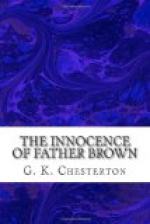“Father,” said Flambeau suddenly, “do you think it was all a dream?”
The priest shook his head, whether in dissent or agnosticism, but remained mute. A smell of hawthorn and of orchards came to them through the darkness, telling them that a wind was awake; the next moment it swayed their little boat and swelled their sail, and carried them onward down the winding river to happier places and the homes of harmless men.
The Hammer of God
The little village of Bohun Beacon was perched on a hill so steep that the tall spire of its church seemed only like the peak of a small mountain. At the foot of the church stood a smithy, generally red with fires and always littered with hammers and scraps of iron; opposite to this, over a rude cross of cobbled paths, was “The Blue Boar,” the only inn of the place. It was upon this crossway, in the lifting of a leaden and silver daybreak, that two brothers met in the street and spoke; though one was beginning the day and the other finishing it. The Rev. and Hon. Wilfred Bohun was very devout, and was making his way to some austere exercises of prayer or contemplation at dawn. Colonel the Hon. Norman Bohun, his elder brother, was by no means devout, and was sitting in evening dress on the bench outside “The Blue Boar,” drinking what the philosophic observer was free to regard either as his last glass on Tuesday or his first on Wednesday. The colonel was not particular.
The Bohuns were one of the very few aristocratic families really dating from the Middle Ages, and their pennon had actually seen Palestine. But it is a great mistake to suppose that such houses stand high in chivalric tradition. Few except the poor preserve traditions. Aristocrats live not in traditions but in fashions. The Bohuns had been Mohocks under Queen Anne and Mashers under Queen Victoria. But like more than one of the really ancient houses, they had rotted in the last two centuries into mere drunkards and dandy degenerates, till there had even come a whisper of insanity. Certainly there was something hardly human about the colonel’s wolfish pursuit of pleasure, and his chronic resolution not to go home till morning had a touch of the hideous clarity of insomnia. He was a tall, fine animal, elderly, but with hair still startlingly yellow. He would have looked merely blonde and leonine, but his blue eyes were sunk so deep in his face that they looked black. They were a little too close together. He had very long yellow moustaches; on each side of them a fold or furrow from nostril to jaw, so that a sneer seemed cut into his face. Over his evening clothes he wore a curious pale yellow coat that looked more like a very light dressing gown than an overcoat, and on the back of his head was stuck an extraordinary broad-brimmed hat of a bright green colour, evidently some oriental curiosity caught up at random. He was proud of appearing in such incongruous attires—proud of the fact that he always made them look congruous.




